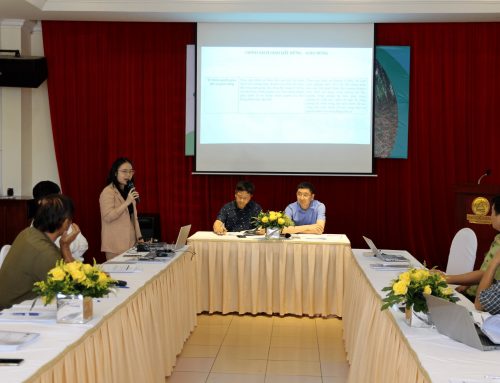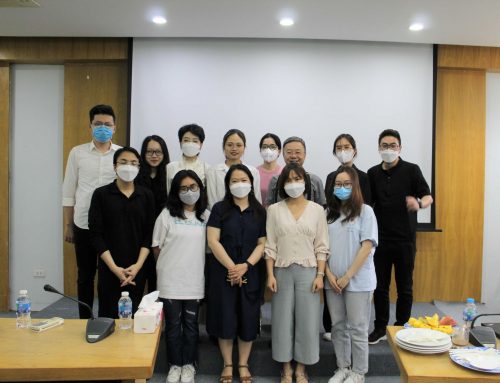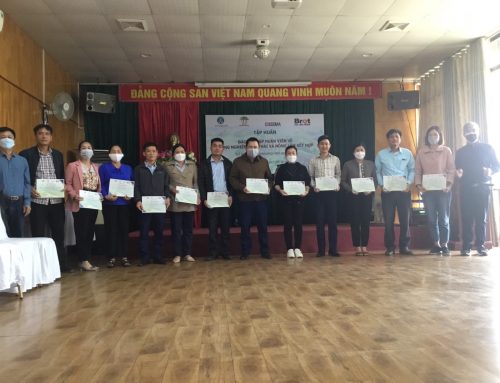On 25-26 of July 2018, CISDOMA conducted a training for 30 farmers to introduce them to an input tracking mobile phone app (rtWork), with a view to implementing it in Tam Duong, Lai Chau, for the summer-autumn maize crop. This smart phone app has the potential to optimize production input management, which facilitates origin tracking and quality control. As a result, product quality, the environment and the community’s health are maintained.
Agricultural products quality and food safety are among the most topical issues in today’s world. In Vietnam, the Government has made significant efforts to encourage the application of cleaner production to ensure food safety for the consumers. There is an increasing number of products that receive official quality certifications such as VietGap, Global Gap, and other organic certifications. Nevertheless, the reality is that consumers still lack confidence in these food safety labels due to their supposedly poor management and procedural discipline.




Pesticides and herbicide containers left on the field
The rapid growth of the smartphone utilisation in Vietnam lays the foundation for an effective collection and supervision of production input data, which improves its traceability. Thus, the producers stand higher chance of acquiring renowned labels and certifications as well as consumers’ trust. At the same time, smartphones allow farmers to network and stay connected to community forums where knowledge and practical information regarding eco-agriculture is discussed.
Within the scopes of the Agro-ecological Learning alliance in South East Asia project (ALiSEA), CISDOMA has conducted training sessions for 30 farmers to use the app rtWork in agricultural production input and process management. These farmers will be this app’s core users, who rely on it to update and follow their state of production. They will pay close attention to the usage of fertilizers, herbicides, and other plant protection chemicals in their local maize crop, with the participation of 100 households. Through this training process, the farmers grasped a basic understanding of and skills in using rtWork to improve their production management. Immediately after the training session, participants started entering actual data of their crops into rtWork on their smartphones to begin its application.
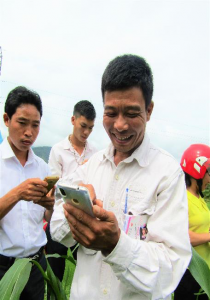
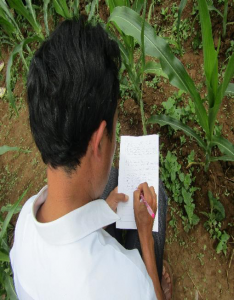
Farmers practicing tracking and entering data
Also, the core farmers group and local officials conducted a preliminary survey with international expert Dr. Pierre Ferrand, Regional Director of ALiSEA project, and Dr. Burra Dharani –International Center for Tropical Agriculture (CIAT). The survey focused on the usage of herbicides on maize crops in Binh Lu and Khao Thau communes. Its results indicated that there was a lack of awareness and inappropriate management of plant protection chemicals and herbicides in the locality. Farmers here still used either highly toxic or even herbicides with banned substance (like Paraquat), and did not properly dispose the containers.
Discussions about rtWork’s applicability showed that all of the participants wanted to apply it to their family production. They believed that not only would this help improve product quality, but it would also minimize risks from purchasing low-quality supplies. A farmer from Khao Thau commune, Tam Duong said: “I usually buy corn seeds from supply stores and grind them into feed for my ducks. Last year, our family lost a lot of ducks, to the value of 30 million dong, because of toxic synthetic preservatives in those maize grains. But the store owner denied any responsibilities and even denying ever selling those grains to me. Had I gone through this training session earlier, I would have been able to trace down the origins of such purchases, and our loss wouldn’t have been as severe.”

Practical training on the field
rtWork, developed by Real-time Analysis Ltd (RTA), is a digital tool to facilitate task management in general and agricultural production management in particular. Introducing this app to farmers will help optimize production processes management, improve product quality, increase consumption and remuneration for the farmers. At the same time, it is highly effective in reducing environmental pollution and ensuring the farmers and consumers’ health.

